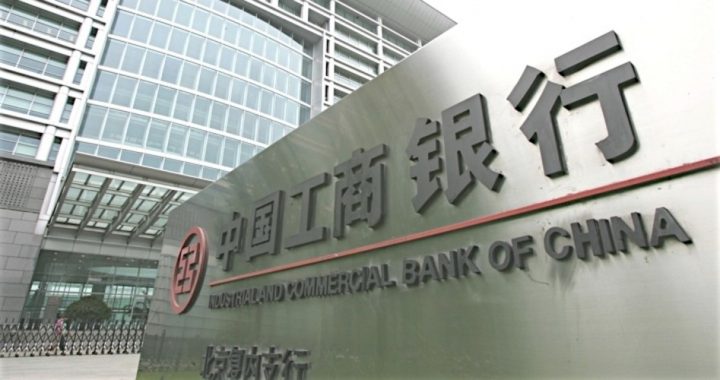
The increasingly controversial Federal Reserve offered a green light on Wednesday for banks controlled by the Communist Chinese dictatorship to gobble up American financial institutions and enter the U.S. banking market despite national security concerns, sparking warnings among critics about the rapid spread of the brutal regime’s influence within America. Analysts, meanwhile, called the unprecedented approval a “landmark step” for regulators that could have global implications.
Under the U.S. central bank’s decision, the Industrial and Commercial Bank of China (ICBC), the largest bank in the Communist Party-run country with assets estimated at some $2.5 trillion, will be allowed to become a holding company and acquire the Bank of East Asia in New York. It marks the first time that a Communist Chinese bank — ICBC is more than 70 percent owned by the regime — has been permitted to take over an American bank. All 13 branches of the U.S. institution will be taken over.
As part of the deal, U.S. authorities also granted bank holding company status to the regime’s sovereign wealth fund, China Investment Corp, which participated in the deal. Central Huijin Investment, which holds the regime’s shares in ICBC, was approved for the classification as well. And according to analysts, Wednesday’s decision by the Fed is just the beginning.
The central bank also approved an application by the communist dictatorship’s massive Bank of China to open another branch in Chicago, adding to its existing footprint in America that includes branches in New York and Los Angeles. In a statement released online, the state-run bank — which has an estimated $1.87 trillion in assets — said it would also be expanding into the central and western regions of the country.
Another megabank owned and operated by the Chinese regime, the Agricultural Bank of China (ABC), was given permission to open its first real U.S. branch in New York. The bank already has a “representative” office in America, but with the Fed’s decision, it will now be allowed to expand its operations with a retail branch.
“It’s a significant milestone for China and the Chinese banks, which will allow them to engage in further business in the U.S. and Europe as well,” banking lawyer Chris Daniel told the Wall Street Journal, alluding to the potential influence of the Fed’s decision on other banking regulators around the world. Other analysts agreed, saying the approval was likely to set a new precedent in allowing the communist regime’s banks to operate more extensively in the West.
According to news reports, the Fed decided to approve what it described as the “relatively small” deals after analyzing the Chinese regime’s banking-supervision system and ensuring that it was adequate, as required by U.S. law. “For a number of years, authorities in China have continued to enhance the standards of consolidated supervision to which banks in China are subject, including through additional or refined statutory authority, regulations, and guidance,” the Fed claimed.
The controversial decision still took more than a year to reach — far longer than the standard two months usually required to issue a ruling on similar matters. It was approved by the Fed board unanimously. But despite U.S. efforts to downplay the significance of the approval, the implications, according to experts, are actually enormous.
In a footnote on its order approving the deals, the U.S. central bank also noted that national security objections about the scheme had been raised. It was not immediately clear what the concerns were or how they were addressed — if at all — but the Fed said reviewing such issues was the responsibility of government agencies, not the privately owned central bank. The Communist Chinese government has long been criticized for its massive international espionage apparatus aimed primarily at the West.
“This unprecedented acquisition of a controlling stake in a U.S. commercial bank by a mainland bank is strategically significant,” Chinese state-run media quoted ICBC chairman Jiang Jianqing as saying. Other financial executives with the regime’s firms — three of China’s top four biggest banks received good news from the Fed this week — expressed similar excitement.
While most observers expect the communist regime to expand its U.S. banking operations slowly and quietly, virtually everyone agrees that expansion is the goal. Guggenheim Securities analyst Jaret Seiberg wrote in a note that Chinese banks may now start looking to take over regional banks to increase the size of their footprint within America — especially through accelerated mergers and acquisitions.
Other experts echoed those comments. “The deal is insignificant to ICBC’s operations but the implications are profound as it opens up the U.S. market to further expansion from ICBC,” Hong Kong-based analyst Mike Werner at Sanford C. Bernstein & Co. explained in a note, calling the deal “a watershed moment, as it makes possible greater participation from other Chinese banks.”
The approvals were issued just a few days after senior U.S. officials including Secretary of State Hillary Clinton, Treasury Secretary Timothy Geithner, and Fed chief Ben Bernanke met with Chinese Communist functionaries in Beijing for yearly “Strategic and Economic Dialogue” meetings. Both governments claimed the controversial discussions had been fruitful.
According to news reports, one of the main results from the talks was an agreement between the two powers that the communist regime would raise its limits on foreign ownership of joint ventures in China dealing with commodities and futures — though foreign stakes in the brokerages will still have to represent minority ownership. In a statement released after the discussions, American officials also promised to “act expeditiously” on the banking issues. And they did.
Some free-market advocates have suggested that shutting out Chinese banks from the U.S. market would be tantamount to protectionism. However, other analysts point out that the financial institutions are not true “companies” in the traditional sense — they are state organs owned and controlled by one of the most ruthless dictatorships on earth, a regime with the blood of tens of millions of victims on its hands.
A few commentators even tried to minimize the significance of the deal. Nathan Vardi with Forbes magazine, for example, wrote that “while China’s big banks and some parts of China’s government appear to be trying to play a bigger role in the global financial system, China’s banks will not play a meaningful role in the U.S. any time soon.” He cited five reasons for his view.
But not everyone is convinced. After decades of what critics call misguided U.S. trade policies, the communist dictatorship has amassed trillions in foreign reserves — mostly denominated in American dollars. And now, those funds are being put to use, gobbling up assets around the world ranging from strategic U.S. companies to huge tracts of land in Africa and Latin America. It is even making moves to set up Chinese “zones” within America. For critics of the brutal regime in Beijing, the trend is troubling.
Meanwhile, even as the Fed draws fire for granting the controversial approvals, it is under serious pressure on other fronts as well. This week, for example, U.S. lawmakers held hearings to discuss reforming or abolishing the central bank altogether — especially because of its unprecedented multi-trillion dollar bank bailouts during the economic crisis including showering funds on Chinese banks.
Legislative measures from both sides of the aisle were considered, with virtually everyone at the monetary policy subcommittee hearing agreeing that the privately owned institution was out of control. Whether the Fed’s recent decision to allow the Chinese regime to take over a U.S. bank will add to the outcry, however, remains to be seen.
Related articles:
Chinese Spying in the United States
Idaho Governor Goes Back to China: Selling Groceries or Green Cards?
China Assures Safety of Pro-Life Dissident, Women and Babies Still in Danger
Congress Debates the Federal Reserve: Reform or Abolish?
Report: China Coerced Chen to Leave U.S. Embassy
Photo: The headquarters of the Industrial and Commercial Bank of China in Beijing, July 19, 2006: AP Images



